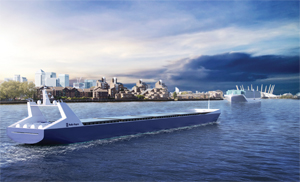The International Maritime Organization (IMO) has suspended its Maritime Safety Committee (MSC) meetings until further notice due to the COVID-19 pandemic. The meetings are at the heart of the IMO process that is taking place to regulate maritime autonomous surface ships (MASS). Even though there’s a pause in the talks, some progress has been made regarding these advanced ships.
The IMO proudly states that the MSC has a strategic plan for both advancing MASS technologies and regulating the technologies it wants to promote. The regulation process is, of course, the more complicated of the two. The IMO is addressing the regulation process by continuing its ongoing scoping exercise, which is a multifaceted MASS study. We knew of the scoping study early on, but now we have a bit more information about what it entails.
The study currently covers multiple subject areas such as safety, security, liability, property damage compensation, international trade, costs, ports, marine environmental issues and personnel issues. The personnel research will include how pilots will be integrated into MASS, as well as the impact to various maritime-related jobs. The study also includes how personnel will respond to MASS incidents. That’s a great deal more information about the scoping study than we had a year ago. The study was due to be concluded by 2020, but that timeline is now in serious doubt.
New guidelines also have been developed by the IMO for trial testing of MASS. The aim of the guidelines is to stress the importance of individual MASS trials first taking into consideration the risks involved. The IMO wants MASS testers to think about safety, security and any possible environmental impacts before conducting such trials. The group wants written plans about the trial risks, as well as incident response plans, set in place ahead of time. Constant monitoring is recommended during the trials themselves — not just an end review or a conclusion report. The IMO also states that certain current regulations for all vessels must be observed by MASS test vessels. Those regulations can be found in the Interim Guidelines for MASS Trials (MSC 1/Circular 1604, Annex, Page 1) on the IMO website. Even though those guidelines don’t mention every current treaty compliance at this time, the IMO has not forgotten about them. It is still a current area of study by the MSC.
We knew before that meshing MASS with current international treaties was going to be a factor in regulating MASS. The main international treaty concern floated around the problem of MASS rendering aid to vessels in distress. As it turns out, that was just the tip of the iceberg regarding global treaties. The MSC is also looking at MASS as it relates to many current international agreements involving navigation rules (COLREGS), Safety of Life at Sea (SOLAS), Standards of Training, Certification and Watchkeeping (STCW), search and rescue (SAR), passenger ship instruments (SPACE STP) and many other subcategories of these agreements. The subcategories run into the double digits and include such concerns as hazardous-waste transportation, oil cleanup and everything in between.
Despite all of these new areas of study, some things have remained constant. The main defined categories of MASS remain the same:
• Degree one: Ship with automated processes and decision support. Seafarers are on board to operate and control shipboard systems and functions. Some operations may be automated and at times be unsupervised, but seafarers are on board ready to take control.
• Degree two: Remotely controlled ship with seafarers on board. The ship is controlled and operated from another location. Seafarers are available on board to take control and to operate the shipboard systems and functions.
• Degree three: Remotely controlled ship without seafarers on board. The ship is controlled and operated from another location. There are no seafarers on board.
• Degree four: Fully autonomous ship. The operating system of the ship is able to make decisions and determine actions by itself.
So, that’s a lot of new information to digest and a lot of new factors for the MSC to consider. In the meantime, the MASS technologies themselves continue to advance, and the number of MASS vessels being built continues to increase. The IMO has issued a caveat regarding all of this new information, though: It’s all subject to change without notice until it’s ratified into law.
Capt. Marc Deglinnocenti is a maritime technical writer. His sea time dates to 1974 in a wide variety of roles on sailboats, conventional and tractor tugboats, training ships, barges, warships, cargo ships, passenger vessels and research vessels. He can be reached by emailing oldarmada@gmail.com.

